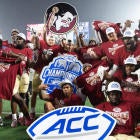Reward just chalked up another one over risk.
That’s got to be the takeaway, doesn’t it, from Oregon’s wrist slap heard ‘round the college football world on Wednesday? Willie Lyles was supposed to be a living, breathing mug shot for third-party influence in the sport. The shining, devious example of how no-names can crawl out of the woodwork, call themselves 7-on-7 “coaches,” and go through life with their hands out.
After much anticipation, the Oregon penalties turned out to be nothing of consequence, not in terms of the message that could have been sent: Stop this crap right now.
This was supposed to be the case in which the NCAA claimed back some turf in that dirty little 7-on-7 war. The association was so serious about the battle, it had hired a former Indianapolis homicide cop to oversee it. Bill Benjamin didn’t last a year and has since resigned.
Instead, the message sent Wednesday was that more Willie Lyles can thrive and survive. OK, so he’s a good guy, a mentor, smart. He’s also the guy who told Yahoo! Sports two years ago, “I look back at it now, and [Oregon] paid for what they saw as my access and influence with recruits. The service I provided went beyond what a scouting service should … I made a mistake, and I’m big enough of a man to admit I was wrong.”
And, by associating with Lyles, so was Oregon.
Who cares if he is disassociated from the program? There will be more like him. There have to be. There aren’t any special qualifications to be a 7-on-7 coach except sometimes the ability to raise money for oneself. Another main message from Wednesday: College football was -- still is -- slipping into the AAU-like slime that has afflicted basketball.
Those wacked-out alternative jerseys that are blowing up football tradition? Sure, they push product. They also influence recruiting. If you don’t think so, pay attention to what has gone on for decades in hoops. Ever read Sole Influence? It will give you an idea of what is creeping into football.
And let’s not forget that the most influential apparel giant of them all (hint: Swoosh trademark) funds Oregon. I’m not going there with any claims of Nike's sole influence in this case, but the Ducks did come out with their wings unclipped: A few scholarships, a former assistant guy was cited, the NCAA wagged its finger at Chip Kelly.
If an NCAA enforcement director wanted to dream, an example could have been made of Oregon. Rightly. Fairly. Mark Emmert did it spectacularly unfairly with Penn State. Two years after writing this, the lead still stands: Oregon can’t be this dumb.
-- By all accounts -- those accounts coming from other coaches -- the $25,000 paid Lyles for his recruiting “service” was way over the top.
-- That recruiting “guide” still looks practically fraudulent.
-- Never mind that Lache Seastrunk was a bust at Oregon; it looks like that $25,000 bought at least some special access for Oregon.
USC fans have to be a bit outraged entering the third year of the Trojans' scholarship limitations, already having suffered a two-year bowl ban. We’re always told it’s not proper to compare cases. But if you believe the three bullet points above, you’ve got to be asking questions today at USC.
Kelly got an 18-month show cause, but so what? He’s gone to the NFL. In fact, his return to the college game lines up almost perfectly. If things bomb in Philly, the show-cause order expires -- meaning Kelly can work again in college -- starting Dec. 26, 2014.
Merry Christmas … USC in 2015?
A case that started so salaciously ended with a pffft! Oregon cooperated and was fortunately represented by the gold standard, Mike Glazier, a Kansas-based attorney and former NCAA investigator. Kelly conveniently went to the Eagles sparing the school any further embarrassment. (To be clear, it doesn’t look like Kelly got out ahead of the posse. Remember that he vacillated before turning down the Bucs in January 2012. I truly think he wanted to be in the NFL this time. I also believe he wouldn’t have been fired had he stayed at Oregon. His penalty was only failure to monitor, the same charge hanging over Missouri men’s basketball coach Frank Haith in the Miami case.)
The base message, then, from Wednesday? Getcha a 7-on-7 sugar daddy as a recruiting aid. It’s worth it. The reward is worth the risk.





















